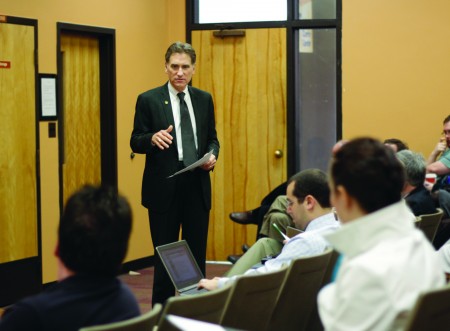
The Board of Regents meet today to discuss the draft recommendations consolidated by the budget planning and review teams, the President’s Office and the vice presidents.
The final draft recommendations include 49 non-academic items and 11 academic items to potentially go into effect July 1.
If the Regents approve every item, the University will increase its annual revenues by approximately $1.1 million and will accrue an annual savings of more than $5 million.
There are an additional 21 non-academic items and one academic item, which are listed on the final draft recommendations, but those items are listed as deferred for further study and analysis.
Of the 82 items on the final draft, The News chose one academic item and two non-academic items to address:
Departmental Merging
One of the 11 academic items set for immediate implementation proposes the department of engineering and physics and the department of industrial and engineering technology merge.
Ted Thiede, chair of the department of engineering and physics, said the proposal to consolidate was done in an effort to better recruit students.
“By consolidating our departments we can cover a whole span of engineering,” he said. “We will be able to share resources and faculty, and by doing so we will be more efficient and effective.”
He said more classrooms and labs would be available for the combined department because of the merge.
The combination of departments would not result in less course work.
Consolidating Diversity
Of the 21 deferred non-academic items on the list is an item that states the President’s Commission on Diversity and Inclusion will reconvene and review the potential for costs savings by combining or consolidating diversity programs to eliminate overlap and provide more integrated programming.
Jody Coder, program coordinator of Undergraduate Research and Scholarly Activity and member of the commission, said via email he was not sure of the rationale behind the recommendation relating to consolidating diversity programs.
“I assume it is to ensure we do everything we can to prevent units from duplicating diversity programming across the institution from an efficiency standpoint,” he said.
Single Admissions Office
Another item on the non-academic deferred list is the consolidation of undergraduate admissions, graduate admissions, the transfer center and international admissions into a single administrative unit.
Maria Rosa, director of the transfer center, said the center was created to create a seamless transfer process that catered more specifically to the unique needs of students coming in from other universities.
“Obviously we all want to serve the University to the best of our abilities,” she said. “But from my standpoint, the loss of those unique services we provide would be of concern.”
Rosa said it was her understanding that the first priority of the University is items slated for immediate implementation. Indeed, steps toward the deferred items will be looked at into the future.
Story by Chris Wilcox, Chief Copy Editor